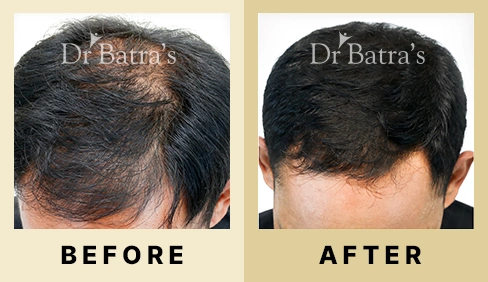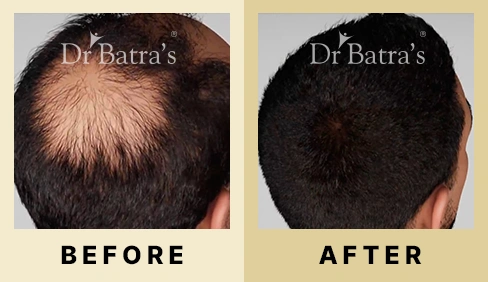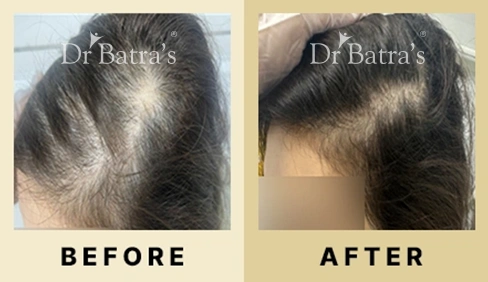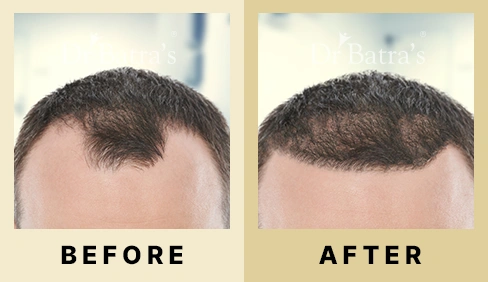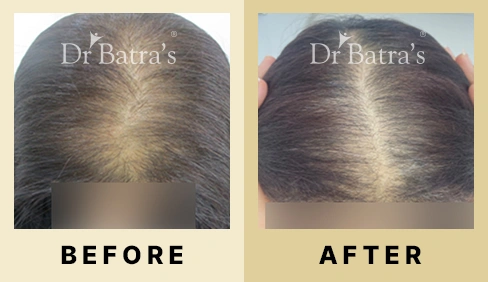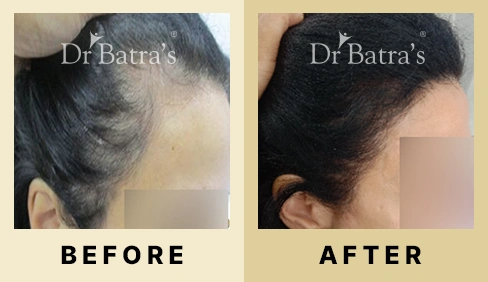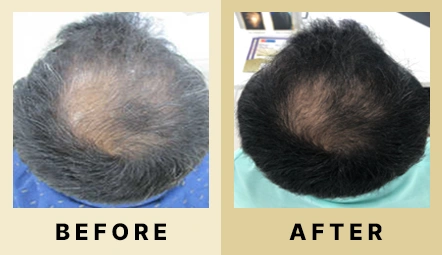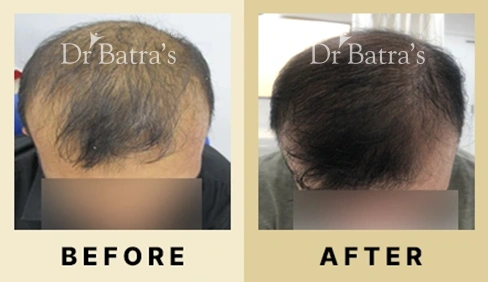Scalp Psoriasis Treatment in Dubai, UAE
If you're looking for Scalp Psoriasis treatment in Dubai, Dr Batra's® offers personalised, natural homeopathic solutions to help reduce itching, flaking and redness caused by scalp psoriasis. With over 35 years of experience and thousands of successful cases, our treatments focus on the root cause of scalp psoriasis for long-term relief.
In the UAE, we customise treatments based on individual scalp assessments and most patients start seeing improvement within 4 to 6 weeks. Our treatments are safe, non-invasive, and free from harsh steroids or immunosuppressants. Each treatment plan is supervised by a dermatologist and is tailored to suit your skin type, medical history and age.
Dr Batra’s® has clinics in both Dubai and Abu Dhabi, offering easy access and plenty of parking at each location. Choose the clinic that’s most convenient for you and take the first step toward healthier hair and scalp.
Book an appointment today and start your journey to healthier hair and scalp. Our approach looks beyond symptoms to find long-term relief. Take your first step to comfort now.
Happy Hair Patients
Why to Choose Dr Batra's® for Scalp Psoriasis Treatment in UAE?
Globally
Globally
Dr Batra's® Healthcare is a leading name for homeopathic treatments that are safe, natural and effective for various hair and skin issues. Here’s why you can trust us when it comes to getting treatment for Scalp Psoriasis.
| Feature | Description |
|---|---|
| Personalized Approach | We take a thorough, personalised approach by analysing your medical history, lifestyle and specific scalp condition |
| Natural Homeopathic Remedies | Our treatments use safe, natural homeopathic remedies to address the root causes of scalp psoriasis. |
| Individualized Care | Each treatment plan is customized to meet the unique needs of each patient, ensuring effective relief and recovery. |
| Effective Management | Our holistic approach targets not only the skin condition but also underlying factors like stress, lifestyle, and hair loss. |
| Safe and Gentle Treatment | Our natural treatments are free from harmful chemicals and side effects, providing safe and gentle healing. |
At Dr Batra's®, we prioritise your holistic health journey by offering specialised care that extends beyond mere symptom relief, aiming to promote lasting wellness.
Patient Testimonials & Success Stories
What Causes Scalp Psoriasis
Scalp psoriasis is believed to result from a combination of genetic, immune system and environmental factors:
| Factor | Description |
|---|---|
| Genetics | A family history of psoriasis increases the risk, with certain genetic variations making individuals more susceptible. |
| Immune System Dysfunction | The immune system mistakenly attacks healthy skin cells, causing inflammation and rapid skin cell production. |
| Environmental Triggers | Stress, infections, skin injury, certain medications, and hormonal changes can trigger flare-ups. |
| Lifestyle Factors | Smoking, excessive alcohol, obesity, and a poor diet may worsen symptoms. |
While these factors may contribute to scalp psoriasis, not everyone with these risk factors will develop it, and not all cases have a clear cause.
Is scalp psoriasis and dandruff the same thing?
Scalp psoriasis and dandruff may appear similar because both cause flaking, but they are different conditions. Dandruff results from an overgrowth of Malassezia yeast combined with scalp oil imbalance, while scalp psoriasis is an autoimmune condition that causes skin cells to reproduce too quickly, leading to thick, silvery scales. Psoriasis also causes redness, itching, and inflammation and may require more targeted medical treatment.
How is Scalp Psoriasis Diagnosed?
Diagnosing scalp psoriasis typically involves a combination of reviewing your medical history, a physical examination and sometimes additional tests. Here’s how the process generally works:
- Medical History The doctor will ask about symptoms, including itching, redness, scaling, and family history of psoriasis.
- Physical Examination A visual exam of your scalp to check for red, thickened patches and scales. A dermatoscope may be used to examine the scalp more closely.
- Scalp Evaluation A small sample of scalp scales may be taken for microscopic examination to confirm psoriasis
- Skin Biopsy (if necessary) A skin biopsy may be conducted to rule out other conditions and confirm psoriasis.
When to see a doctor
It's important to see a doctor if you experience symptoms suggestive of scalp psoriasis or if you have been previously diagnosed with psoriasis and notice new or worsening symptoms on your scalp. Here are some indications that it's time to seek medical attention:
- Persistent Scalp Symptoms If redness, itching, scaling or flaking doesn’t improve with over-the-counter treatments.
- Visible Changes Thick, scaly patches or raised red areas on the scalp.
- Pain or Discomfort Scalp psoriasis can cause pain or burning sensations, requiring medical attention.
- Difficulty Managing Symptoms If symptoms are worsening despite using over-the-counter treatments or interfering with daily life.
- Emotional Impact Psoriasis can affect emotional well-being, so seek medical and emotional support if you're feeling distressed.
If you experience persistent scalp symptoms, it’s time to consult our experts for personalized care.
Types of Hair Fall That Can Be Treated by Dr Batra's® Hair Fall Treatment
There are several types of hair fall that we can treat, including the following:
- Androgenetic Alopecia (Male/Female Pattern Baldness): This is the most common type of hair loss, characterized by a gradual thinning of hair, typically on the top and front of the scalp. It's often hereditary and can be influenced by hormones.
- Telogen Effluvium: This type of hair loss occurs when a large number of hair follicles enter the resting phase (telogen) simultaneously, leading to increased shedding. It can be triggered by stress, illness, hormonal changes, or nutritional deficiencies.
- Alopecia Areata: Alopecia areata is an autoimmune condition where the immune system mistakenly attacks hair follicles, leading to hair loss in small, round patches on the scalp or other parts of the body
- Traction Alopecia: Traction alopecia occurs when constant pulling or tension on the hair damages the hair follicles. It's commonly seen in individuals who frequently wear tight hairstyles like ponytails, braids, or extensions.
- Anagen Effluvium: This type of hair loss is often caused by exposure to toxins, such as chemotherapy drugs, which disrupt the growth phase (anagen) of the hair follicles, leading to sudden and widespread hair loss.
- Changes in hair texture: The texture of your hair may change, becoming finer or more brittle.
- Trichotillomania: Trichotillomania is a psychological disorder characterized by the compulsive urge to pull out one's hair, leading to noticeable hair loss and bald patches.
Identifying the specific type of hair loss is crucial for determining the appropriate treatment approach. Consulting with a healthcare professional or dermatologist is recommended for accurate diagnosis and personalized treatment options.
Not sure which type of hair fall you're facing? Dr Batra's® hair experts can help.
Get Hair Fall Treatment at our State of the Art Homeopathy Clinics





Our Expert Hair Doctors
Consultation Process for Scalp Psoriasis Treatment at Dr Batra’s®
Step 1: Initial Consultation A comprehensive consultation to understand the root causes of your scalp psoriasis, including your medical history, lifestyle and scalp condition. Using advanced diagnostics, we gather a detailed picture of your scalp health.
Step 2: Medical Diagnosis Physical examination, possible scalp scraping and a detailed discussion of your symptoms help determine the most suitable treatment plan.
Step 3: Personalised Treatment Based on your diagnosis, we provide a customised treatment plan using homeopathic remedies and additional therapies such as phototherapy, mesotherapy and oxygen-infused scalp therapy.
Step 4: Lifestyle Advice We provide lifestyle recommendations, including stress management and dietary changes, to support the healing process and prevent flare-ups.
FAQs
What are the symptoms of scalp psoriasis?
Symptoms of scalp psoriasis include red patches on the scalp covered with thick, silvery scales; itching; dry scalp; bleeding or soreness; and in severe cases, hair loss.
How is scalp psoriasis diagnosed?
Scalp psoriasis is typically diagnosed based on a physical examination of the scalp and the characteristic appearance of the lesions. Sometimes a skin biopsy may be performed to confirm the diagnosis.
What are the treatment options for scalp psoriasis?
Treatment for scalp psoriasis may include topical medications like corticosteroids or vitamin D analogues, phototherapy (light therapy), systemic medications (oral or injected medications), and lifestyle modifications.
What is the prognosis for scalp psoriasis??
Scalp psoriasis is a chronic condition that tends to cycle through periods of flare-ups and remission. With proper treatment and management, symptoms can often be controlled effectively, but the condition may recur.
Why choose Dr.batras over Other Doctors?
While others may focus on cosmetic dermatology, we specialize in holistic scalp health using a blend of medical science and homeopathy. Our approach is non-steroidal, personalized, and deeply rooted in scalp biology.
Are your clinics DHA approved?
Yes, all our UAE clinics are fully licensed and operate under DHA and MOH regulations. Our doctors are also locally certified.
What happens if my psoriasis comes back?
We offer maintenance plans and lifestyle guidance to reduce relapse risk. Should symptoms return, follow-up treatments are discounted and prioritized.



